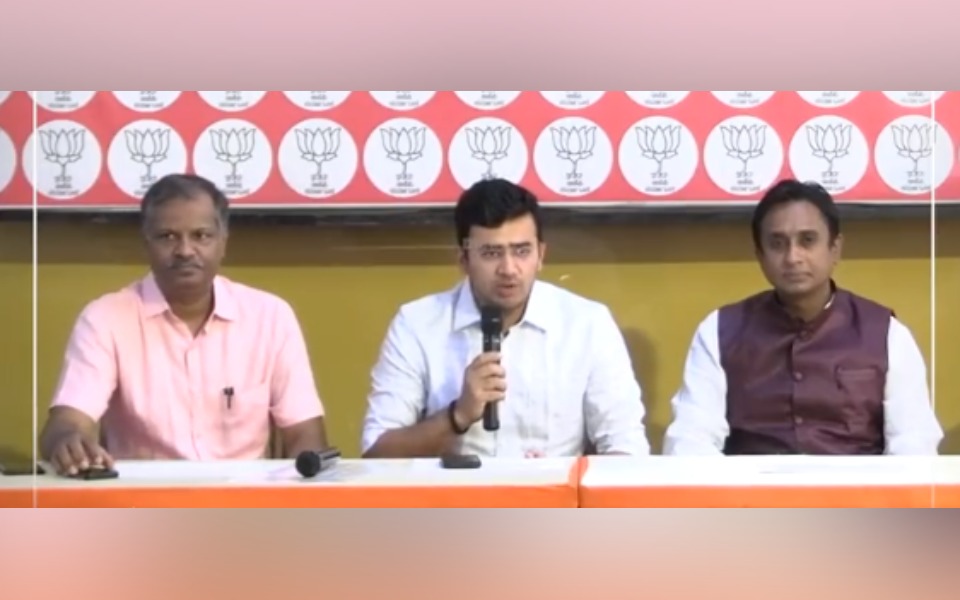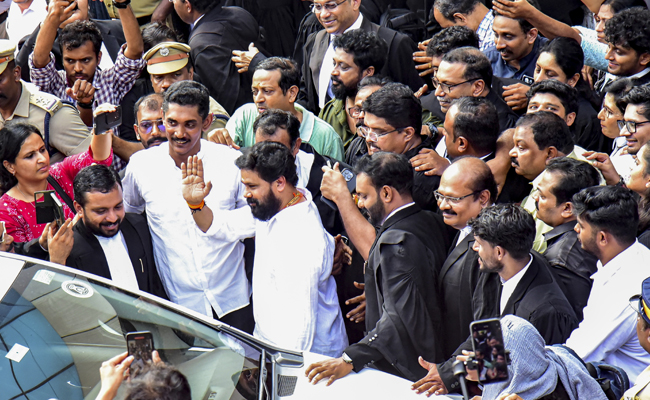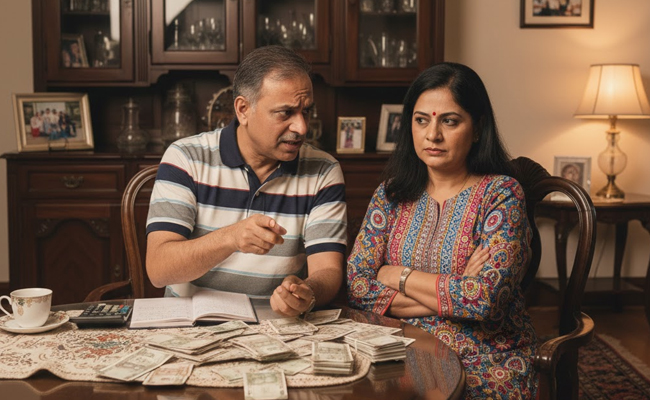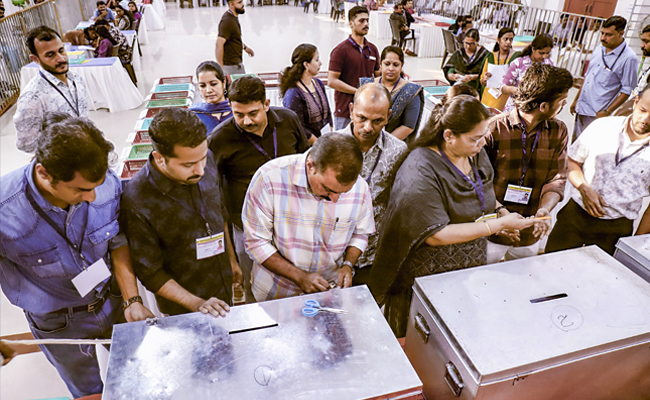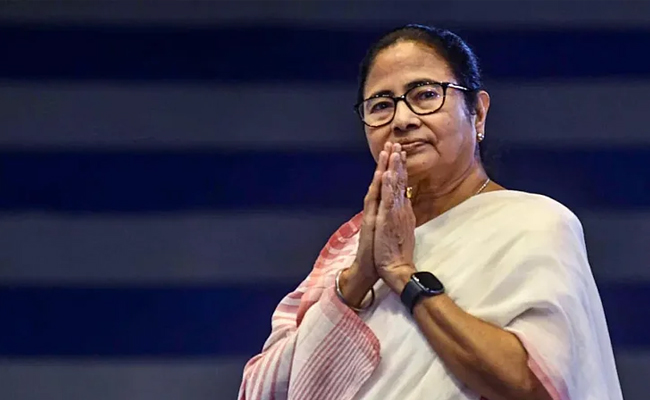Bengaluru, Jun 10: The Karnataka unit of the BJP on Saturday launched a helpline number to provide legal assistance to the party activists against whom "false cases" are registered by the Congress government in the state.
The service has been started to assist the party workers to fight the police cases against them legally, Bengaluru South MP and Bharatiya Janata Yuva Morcha president Tejasvi Surya said after launching the helpine.
The helpline number -- 18003091907 -- was launched against the "vindictive politics of the Congress government", Surya said.
"Ever since the Siddaramaiah-led Congress government has taken over governance in Karnataka, attempts are being made to stifle the voice of the opposition, especially the karyakartas (workers) of the Bharatiya Janata Party," the BJP MP told reporters.
In the last two-three weeks, senior Karnataka ministers have been making statements warning BJP workers of facing strict legal and police action in case they make statements opposing the policies of the government, Surya alleged.
ALSO READ: Karnataka women can travel up to 20 km inside border states free of cost in buses: Siddaramaiah
"We have already witnessed two instances where our karyakartas have faced police brutality, police action for so much so as tweeting against the Chief Minister, having a caricature made against the Chief Minister and making it as their display picture on the WhatsApp," the MP alleged.
He also alleged that Karnataka Home Minister G Parameshwara has also specifically stated that in the coastal areas of the state, various cultural organisations inspired by the RSS would be tackled with brute force and the government intends to constitute a special task force (STF) to deal with these organisations and its members.
"It appears that the Home Minister of Karnataka is directly taking orders from the PFI and is making these kinds of comments. We have seen in the past the brutal murder of BJP/RSS karyakartas by the radical terrorist elements. The Congress party government then did not register proper FIRs, did not conduct investigations properly, diluted the FIRs filed, adulterated charge sheets were filed so that the perpetrators of those crimes be let free," he claimed.
ಕಾನೂನಾತ್ಮಕವಾಗಿ ಕಾಂಗ್ರೆಸ್ ದಾಳಿಯ ವಿರುದ್ಧ ನಮ್ಮ ಹೋರಾಟದಲ್ಲಿ, ಯಾವುದೇ ರಾಜಿ ಇಲ್ಲ.
— Tejasvi Surya (@Tejasvi_Surya) June 10, 2023
ನಮ್ಮ ಕಾರ್ಯಕರ್ತರ ಮೇಲೆ ಸುಳ್ಳು ಕೇಸು ದಾಖಲಿಸಿ ಜೈಲಿಗೆ ಹಾಕುವುದಾಗಿ ಕಾಂಗ್ರೆಸ್ನ ಸಚಿವರು ಬಹಿರಂಗವಾಗಿ ಬೆದರಿಕೆ ಹಾಕುತ್ತಿರುವುದು ನಾಚಿಕೆಗೇಡಿನ ಸಂಗತಿ.
ನಮ್ಮ ಕಾರ್ಯಕರ್ತರ ರಕ್ಷಣೆಗೆ, @BJP4Karnataka Legal Cell ರಾಜ್ಯದ 100+ ವಕೀಲರ… pic.twitter.com/ulV82eefB9
Let the Truth be known. If you read VB and like VB, please be a VB Supporter and Help us deliver the Truth to one and all.
Kochi (PTI): The prosecution had "miserably" failed to prove the conspiracy charge against Dileep in the sensational 2017 actress sexual assault case, a local court has observed while citing inconsistencies and lack of sufficient evidence against the Malayalam star.
The full judgement of Ernakulam District and Principal Sessions Court Judge Honey M Varghese was released late on Friday, and has revealed the judge also pointing out at unsustainable arguments put forth by the prosecution.
"The prosecution miserably failed to prove the conspiracy between accused No.1 (Pulsar Suni) and accused No.8 (Dileep) in executing the offence against the victim," the court held.
It examined in detail, the prosecution's allegation that Dileep had hired the prime accused to sexually assault the survivor and record visuals, including close-up footage of a gold ring she was wearing, to establish her identity.
On page 1130 of the judgment, under paragraph 703, the court framed the issue as whether the prosecution's contention that NS Sunil (Pulsar Suni) recorded visuals of the gold ring worn by the victim at the time of the occurrence, so as to clearly disclose her identity, was sustainable.
The prosecution contended Dileep and Suni had planned the recording so that the actress' identity would be unmistakable, with the video of the gold ring intended to convince Dileep that the visuals were genuine.
However, the court noted that this contention was not stated in the first charge sheet and was introduced only in the second one.
As part of this claim, a gold ring was seized after the victim produced it before the police.
The court observed that multiple statements of the victim were recorded from February 18, 2017, following the incident, and that she first raised allegations against Dileep only on June 3, 2017.
Even on that day, nothing was mentioned about filming of the ring as claimed by the prosecution, the court said.
The prosecution failed to explain why the victim did not disclose this fact at the earliest available opportunities.
It further noted that although the victim had viewed the sexual assault visuals twice, she did not mention any specific recording of the gold ring on those occasions, which remained unexplained.
The court also examined the approvers' statements.
One approver told the magistrate that Dileep had instructed Pulsar Suni to record the victim's wedding ring.
The court observed that no such wedding ring was available with her at that time.
During the trial, the approver changed his version, the court said.
The Special Public Prosecutor put a leading question to the approver on whether Dileep had instructed the recording of the ring, after which he deposed that the instruction was to record it to prove the victim's identity.
The court observed that the approver changed his account to corroborate the victim's evidence.
When the same question was put to another approver, he repeated the claim during the trial but admitted he had never stated this fact before the investigating officer.
The court noted that the second approver even went to the extent of claiming Dileep had instructed the execution of the crime as the victim's engagement was over.
This showed that the evidence of the second approver regarding the shooting of the ring was untrue, as her engagement had taken place after the crime.
The court further observed that the visuals themselves clearly revealed the victim's identity and that there was no need to capture images of the ring to establish identity.
In paragraph 887, the court examined the alleged motive behind the crime and noted that in the first charge sheet, the prosecution had claimed that accused persons 1 to 6 had kidnapped the victim with the common intention of capturing nude visuals to extort money by threatening to circulate them and there was no mention about Dileep's role in it.
The court also rejected the prosecution's claim that the accused had been planning the assault on Dileep's instructions since 2013, noting that the allegation was not supported by reliable evidence.
It similarly ruled out the claim that Suni attempted to sexually assault the victim in Goa in January 2017, stating that witness statements showed no such misconduct when he served as the driver of the vehicle used by the actress there.
The court also discussed various controversies that followed Dileep's arrest and the evidence relied upon by the prosecution, ultimately finding that the case had not been proved.
Pronouning its verdict on the sensational case on December 8, the court acquitted Dileep and three others.
Later, the court sentenced six accused, including the prime accused Suni, to 20 years' rigorous imprisonment.
The assault on the multilingual actress, after the accused allegedly forced their way into her car and held it under their control for two hours on February 17, 2017, had shocked Kerala.
Pulsar Suni sexually assaulted the actress and video recorded the act with the help of the other convicted persons in the moving car.

